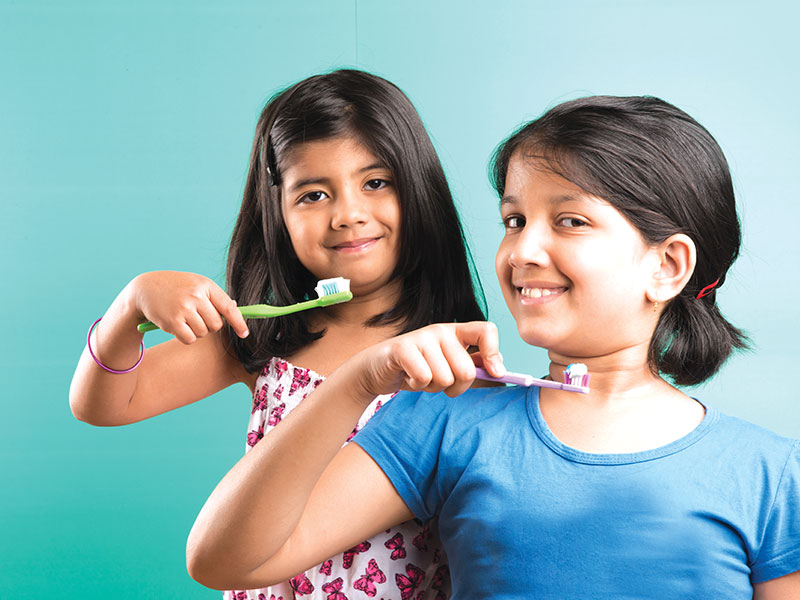Dental care primer for youngest children

In too many Indian households, including well-educated middle class homes, oral hygiene is often neglected in the false belief that deciduous (milk) teeth are unimportant. Quite the contrary. Several research studies have firmly established that cavities in primary teeth further increase the risk of caries in permanent teeth. therefore, it’s important for parents to set a proper oral care and dental hygiene routine for youngest children. Investing time and effort in teaching children dental hygiene is critical for ensuring strong and healthy teeth and savings on dentists’ bills.
Dr. Janani Rangaswamy of Growing Smiles Pediatric Dentistry, Bangalore, has written a dental care and hygiene primer for parents of youngest children.
Watch out for milk teeth
Milk teeth begin to manifest when an infant is six months old. Usually, the first to break through the gums are the front teeth, aka incisors, while the other teeth will continue to erupt until the child is about three years of age.
Clean gums
It is important to start cleaning an infant’s gum pads even before the first milk teeth erupt. When a child is teething, use a wet washcloth to remove debris and bacteria from gums. Bacteria that fester on the gums can cause infection. Begin a dental care regimen early.
Brush twice a day
At about 18 months, parents can initiate the teeth brushing routine. Begin with a small amount of toothpaste. For children under three years of age, the quantity of toothpaste should be the size of a rice grain. For children older than three, use a little more toothpaste, about the size of a green pea. the brushing routine should last about two minutes in the morning and at night before bedtime. this will instil good oral care habits and protect children from developing cavities later on. Typically, the front bottom teeth are the first to erupt. When they break through the gums and start to touch, use dental floss to clean between the teeth. this will keep caries away. Teach children proper flossing techniques from young age.
Allow selection of toothbrush
As children get older, they want more control over their choices. give them freedom to choose a toothbrush. Selecting a brush with a photo of their favourite tV character or favourite colour can be an incentive for them to brush their teeth. Also let them choose a toothpaste with the flavour and texture they like.
Make regular visits to the dentist
Regular consultation with a dentist is critical to ensuring children’s dental health. Visit the dentist when your child’s first tooth breaks, or by her first birthday. Dentists can provide valuable information on teething and dental hygiene.
To ensure children’s dental health, avoid the following:
Refined Sugars
A sugar-rich diet can adversely impact children’s teeth and gums. Juices and sodas that are rich in acid and sugar can damage milk teeth. Also, foods rich in refined sugar can damage teeth enamel, placing the child at greater risk of developing cavities.
Pacifiers
Though mouth pacifiers sooth and calm fussy infants, they can cause damage to children’s deciduous teeth if used for too long. if a child uses a pacifier past the age of three, it can impact the way the teeth line up and change the shape of her mouth.
Thumb-sucking
Children tend to suck on their thumb as a response to stress. Vigorous thumb-sucking by children can cause misalignment of teeth and affect the jaw or the shape and roof of the mouth.
Discourage children from thumb-sucking. identify the stress trigger and comfort them with a hug and/ or a stuffed toy. Also, praising the child or providing minor rewards — such as an extra bedtime story or walks in the park — when they aren’t thumb-sucking, will go a long way in eliminating this habit.
Also read: Immunity boosting treats














Add comment